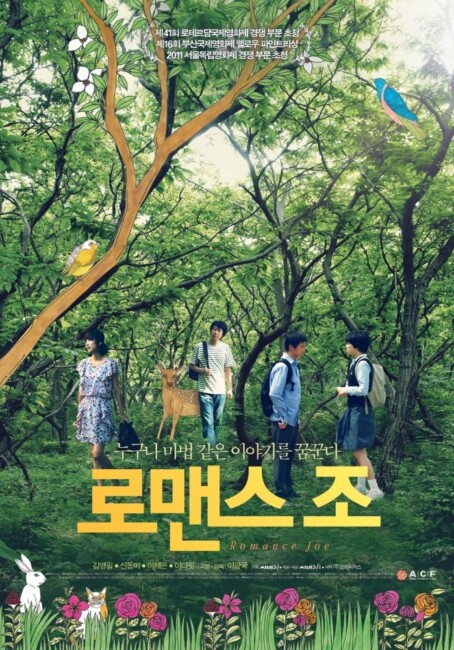(Lo-Maen-Seu Jo)
Crew
Director/Screenplay – Lee Kwang-kuk, Producer – Yim Soon-rye, Photography – Jee Yune-jong, Music – Park Jin-seok. Production Company – Bori Pictures.
Cast
Kim Yeong-pil (Romance Joe), David Lee (Young Romance Joe), Jo Han-cheol (Lee), Shin Dong-mi (Re-ji), Lee Chae-eun (Kim Cho-hui), Kim Dong-hyeon (Seo Dam), Baek Ik-nam (Gwon)
Plot
Two parents arrive at a hotel where they talk to Seo Dam, a man who promises news of their son Lee, a film director who went missing. Lee had sold a screenplay to Seo Dam and was then deliberately abandoned at a remote hotel near Mount Godong until he completed it. He encountered a maid/prostitute Rei-ji who convinced him to pay for her for the night where she told the story of a suicidal director known as Romance Joe who she befriended while staying there. Romance Joe told her the story of when he was a teenage boy and befriended Kim Cho-hui after encountering her trying to kill herself because of vicious rumours being spread about her. The two of them decided to run away to Seoul together. In another story, a young boy came to the cafe looking for his mother and was grudgingly taken under the wing of Rei-ji.
Romance Joe was the directorial debut of South Korean Lee Kwang-kuk, a former assistant director to Hang Song-soo on films such as Tale of Cinema (2005) and Hahaha (2010). Lee Kwang-Kuk and Hang Song-soo have an undeniable similarity of style in their fascination with told tales, the playfulness of narrative and the frequent featuring of directors as characters.
Romance Joe had some international festival play. It is largely a series of interwoven tales where Lee Kwang-kuk winds the entire film around a series of stories being told and then further stories being told by characters within the stories. Lee has determined to make the narrative as convoluted as possible. Characters from one story turn up in others and other tales concern characters at different periods in their lives. To this extent, I frequently found myself confused as to which characters were which at any one time.
This makes Romance Joe resemble literary works such as The Life and Opinions of Tristram Shandy, Gentleman (1759-69) by Laurence Sterne, an entire novel that consisted of constant digressions, or the narrative game-playing of a film like The Saragossa Manuscript (1965), maybe even at a stretch something like Dennis Potter’s masterwork The Singing Detective (1986) and its constant interweaving layers of fiction, autobiography and meta-fiction.
Rather than any theme that comes through the various tales (unless you want to consider the number of characters preoccupied with suicide), it is Lee Kwang-kuk’s game playing with the narrative device that becomes the whole of the film. The downside of this is that the nature of the narrative entirely overshadows and gets in the way of the stories being told. Not all of the segments succeed in engaging one in the characters or the stories that play out. Nor do all of the stories feel emotionally satisfying. The best segment is the one with the teenage Romance Joe and his tentative relationship with Cho-hui. The latter half of this plays out with an appealing sense of awkward teenage first love, although even then the film leaves their story unfulfilled and incomplete.
The film ends with the adult Romance Joe being pulled up by a Korean police officer and asked for his papers, only to be revealed that his identity doesn’t exist in the system whereupon the officer points to a rabbit and speculates that maybe he came from the rabbit hole. It seems a rather frivolous shaggy dog ending for an otherwise realistic film to go out on.
Lee Kwang-kuk next went onto make A Matter of Interpretation (2014) set in a similar story labyrinth where dreams keep blurring together.


